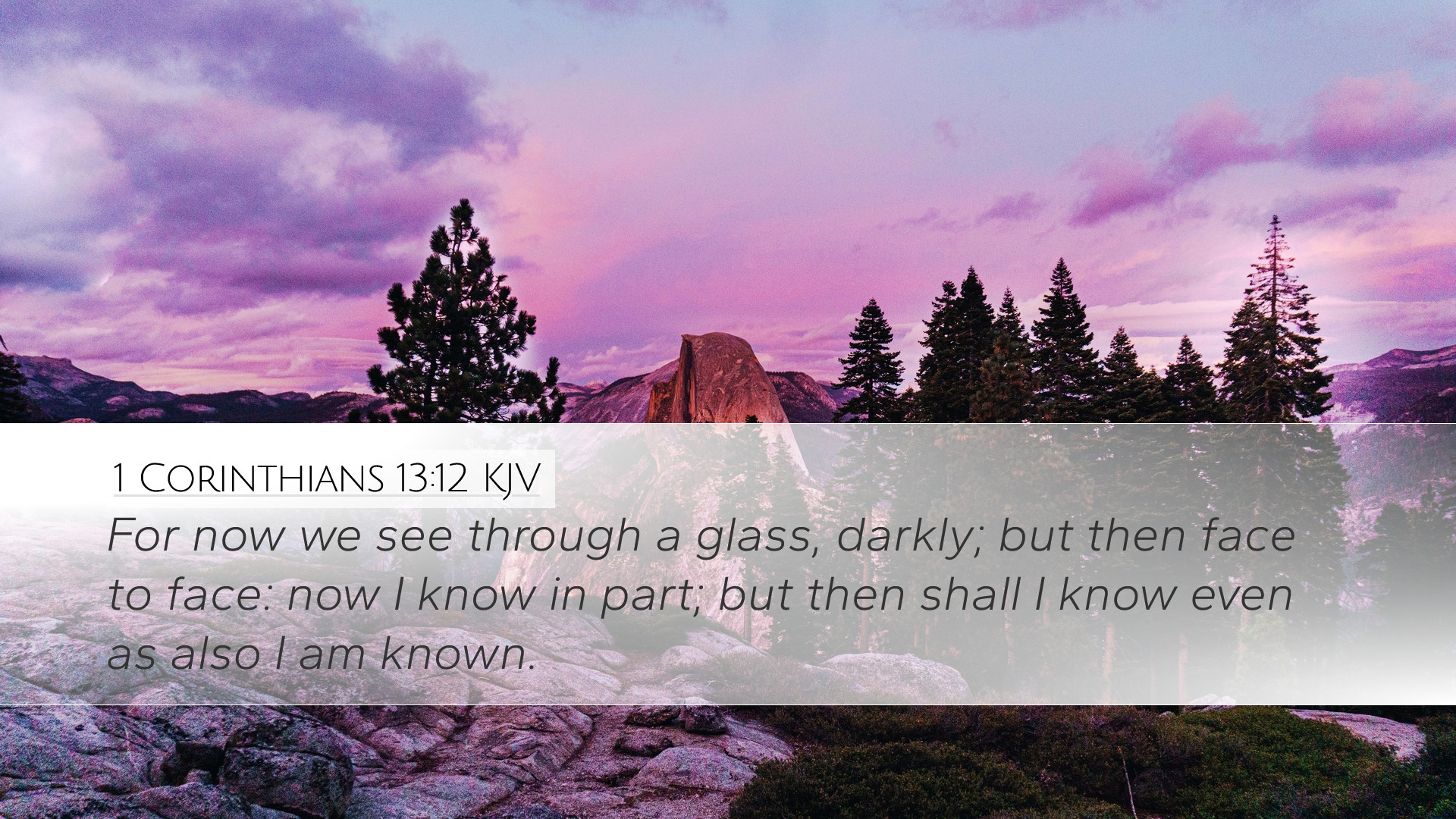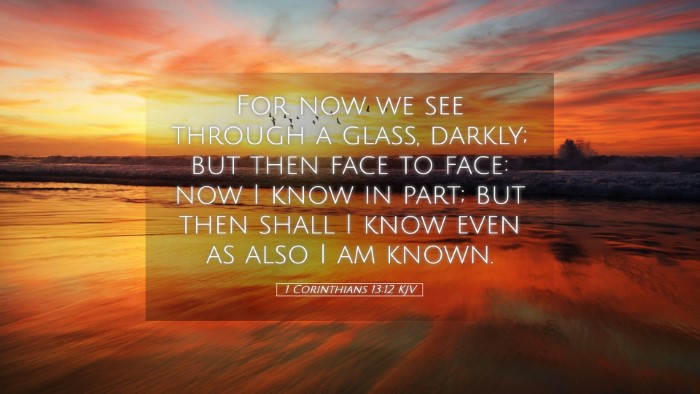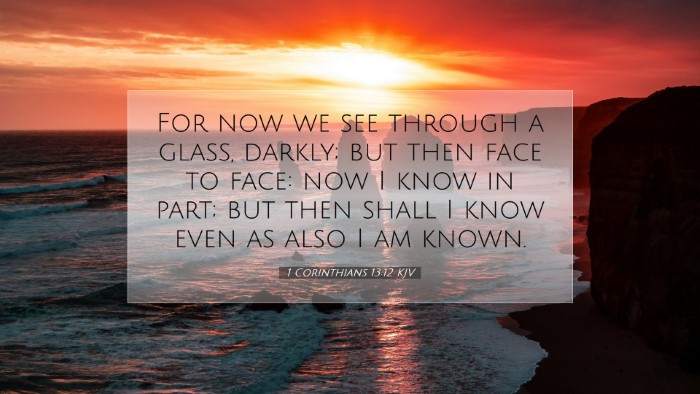Old Testament
Genesis Exodus Leviticus Numbers Deuteronomy Joshua Judges Ruth 1 Samuel 2 Samuel 1 Kings 2 Kings 1 Chronicles 2 Chronicles Ezra Nehemiah Esther Job Psalms Proverbs Ecclesiastes Song of Solomon Isaiah Jeremiah Lamentations Ezekiel Daniel Hosea Joel Amos Obadiah Jonah Micah Nahum Habakkuk Zephaniah Haggai Zechariah Malachi1 Corinthians 13:12
1 Corinthians 13:12 KJV
For now we see through a glass, darkly; but then face to face: now I know in part; but then shall I know even as also I am known.
1 Corinthians 13:12 Bible Commentary
Commentary on 1 Corinthians 13:12
Verse: "For now we see through a glass, darkly; but then face to face: now I know in part; but then shall I know even as also I am known." (1 Corinthians 13:12, KJV)
Introduction
The Apostle Paul's discourse on love culminates in this profound verse from 1 Corinthians 13:12, addressing the nature of knowledge and perception in both the present life and the life to come. This passage has long been a source of theological reflection, evoking the tension between our current limited understanding and the completeness of divine knowledge. Various public domain commentaries, such as those by Matthew Henry, Albert Barnes, and Adam Clarke, offer rich insights into its meaning.
Contextual Analysis
Paul, in the preceding verses, emphasizes the supremacy of love over spiritual gifts. He illustrates the ephemeral nature of these gifts, with love being the enduring element of Christian life. This verse serves as a transition from discussing the gifts of the Spirit to the fullness of knowledge in the eschatological future. The imagery Paul employs invites the readers to consider their current spiritual state and the hope of future revelation.
Verse Breakdown
Examining the verse, we find two contrasting states: the “now” and the “then.”
- “For now we see through a glass, darkly”:
Paul uses the metaphor of seeing through a glass, which many scholars suggest refers to a polished metal mirror, commonly used in the ancient world. The vision, although real, is obscured and unclear. This reflects our current understanding of divine things as partial and imperfect.
- “But then face to face”:
Contrasting the previous state, Paul asserts that in the future, believers will have unmediated access to God, “face to face.” This denotes an intimate relationship and direct knowledge of God, free from the limitations of the present world.
- “Now I know in part; but then shall I know even as also I am known”:
This statement from Paul emphasizes the incomplete state of human understanding now. Knowledge is partial, akin to looking at a distant object through a fogged window. In contrast, the future knowledge will be comprehensive and personal, much like God’s perfect knowledge of us.
Theological Reflections
This verse teaches crucial theological principles about revelation, knowledge, and the nature of eternity. It is essential for pastors and theologians to consider the implications of partial knowledge versus complete knowledge in their teachings and reflections on faith.
- The Nature of Revelation:
Paul's imagery implies that divine truths are revealed progressively. Spiritual understanding evolves throughout the believer’s journey; thus, humility and reliance on God are fundamental in our quest for knowledge.
- The Promise of Completeness:
As believers, there is a promise of certainty and completeness in the hereafter. This anticipation provides hope amidst the struggles of faith and understanding in this life.
- The centrality of Love:
The previous context of love emphasizes that knowledge without love is incomplete. Even in our current state of partial understanding, love remains the greatest virtue.
- Practical Implications for Ministry:
Pastors should help their congregations navigate their spiritual journeys with the understanding that questions and doubts are normal. They can convey the importance of seeking truth while holding fast to love.
Commentary Insights
Matthew Henry’s Commentary
Matthew Henry underscores the limitations of earthly understanding, portraying our current knowledge as shadowy in contrast to the bright truth that awaits in the presence of God. He emphasizes that in heaven, all darkness will disperse, and we will know God fully. He highlights that our present ignorance should not deter us from seeking God earnestly, as our limited understanding does not diminish the reality of God’s presence and love.
Albert Barnes’ Notes
Albert Barnes notes that the apostle employs the metaphor of a glass to illustrate not merely a lack of clarity but also the transient nature of human knowledge. He stresses that the perfect knowledge that Paul refers to will bring about a transformation in believers, aligning their understanding more closely with God’s. Barnes points out that this passage instills hope and encourages believers to remain steadfast in their faith amidst uncertainty.
Adam Clarke’s Exposition
Adam Clarke elaborates on the phrase “darkly” as indicating a mere reflection of reality, which suggests that our current knowledge is akin to an image seen in a darkened mirror. Clarke emphasizes the joyous expectation of the future when believers will see God as He is and will engage in a deeper communion with Him and one another. He reminds believers that despite encountering partial truths now, they are assured of complete knowledge to come, highlighting the exciting prospect of eternal fellowship with God.
Conclusion
1 Corinthians 13:12 encapsulates the tension of the ‘now’ and the ‘then’ in our understanding of God and spiritual realities. This verse serves as a reminder of the importance of love in the Christian faith while also assuring believers of a promised fullness of knowledge in the eternal state. Through the reflections of esteemed commentators, it becomes evident that our earthly journeys are marked by hope, growth, and the unwavering call to love amidst the uncertainties of life.


